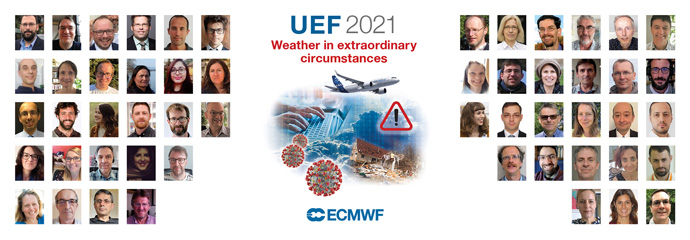A forum for exchanging ideas and experiences on the use of ECMWF data and products
"Using ECMWF’s Forecasts” provides a platform to discuss the use and performance of ECMWF's forecasts and related products. It is open to all ECMWF forecast users around the world and provides an opportunity to give feedback to ECMWF on forecast performance and on the range of available products, to learn about ECMWF’s recent developments of its forecasting system and to share experiences and network with ECMWF and other users.
UEF2021 was a fully virtual event due to the Covid-19 restrictions.
2021 theme: "Weather in extraordinary circumstances"
Overview
The last year and numerous past events have proved that the meteorological community has been able to provide products and services to users in the most extraordinary circumstances.
COVID-19 has affected everyone in the world. Busy forecasting departments and offices are now quiet: we have all had to get accustomed to working from home, working with our colleagues remotely and attending conferences and meetings from the sofa.
National weather services and private weather providers have worked to adapt to the current situation and its consequences. At ECMWF reduced aircraft observation data led to new datasets being explored and assimilated into NWP, model upgrades were successfully implemented, and products and services continued to be developed to provide better forecasts to users, despite staff having had to work from home.
Furthermore, projects on the European Weather Cloud have demonstrated the benefits of bringing data closer to computing.
The weather itself can also be extraordinary. Extreme events are occurring more frequently increasing the need for products and services to forecast severe weather and extremes all over the world. The Copernicus Atmospheric Monitoring Service and the Copernicus Climate Change Service, implemented by ECMWF on behalf of the European Union, provide early warnings for natural hazards, data and information on atmospheric composition and support climate change adaptation and mitigation policy through access to climate data.
The theme of this year's UEF encompassed the extraordinary circumstances of the last year as well as other exceptional events which impacted forecasting, modelling, users and the public. It also explored what was done to overcome any impacts, share experiences and learn about any collaborative activities so we can be as prepared as we can be, as a community, for when something extraordinary occurs.
Oral and poster presentation submissions were encouraged for the thematic areas. Case studies or stories of extraordinary circumstances and how they were overcome were particularly welcomed. There was also an option for workshop proposals: these are more interactive sessions.
